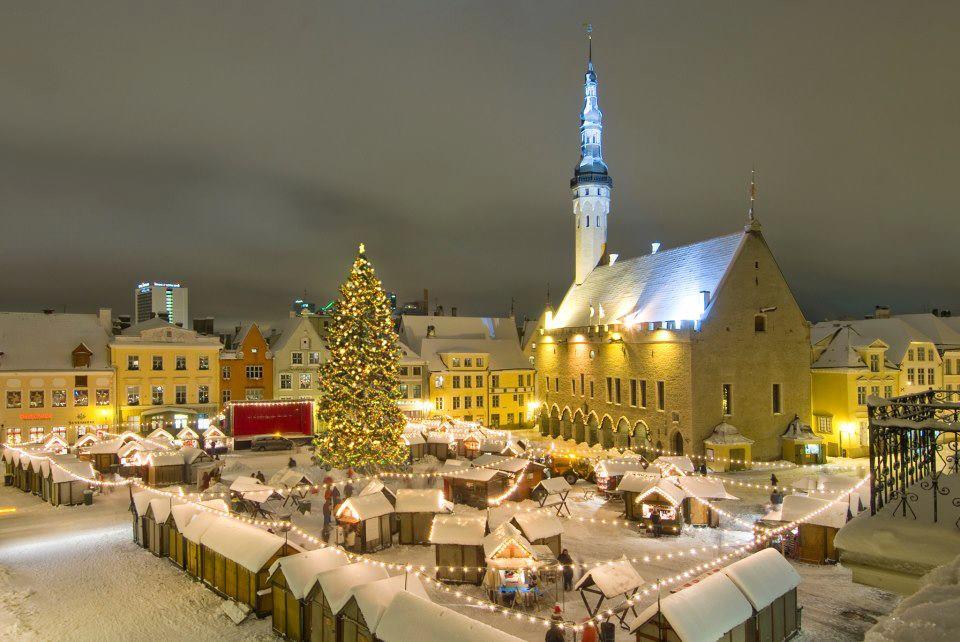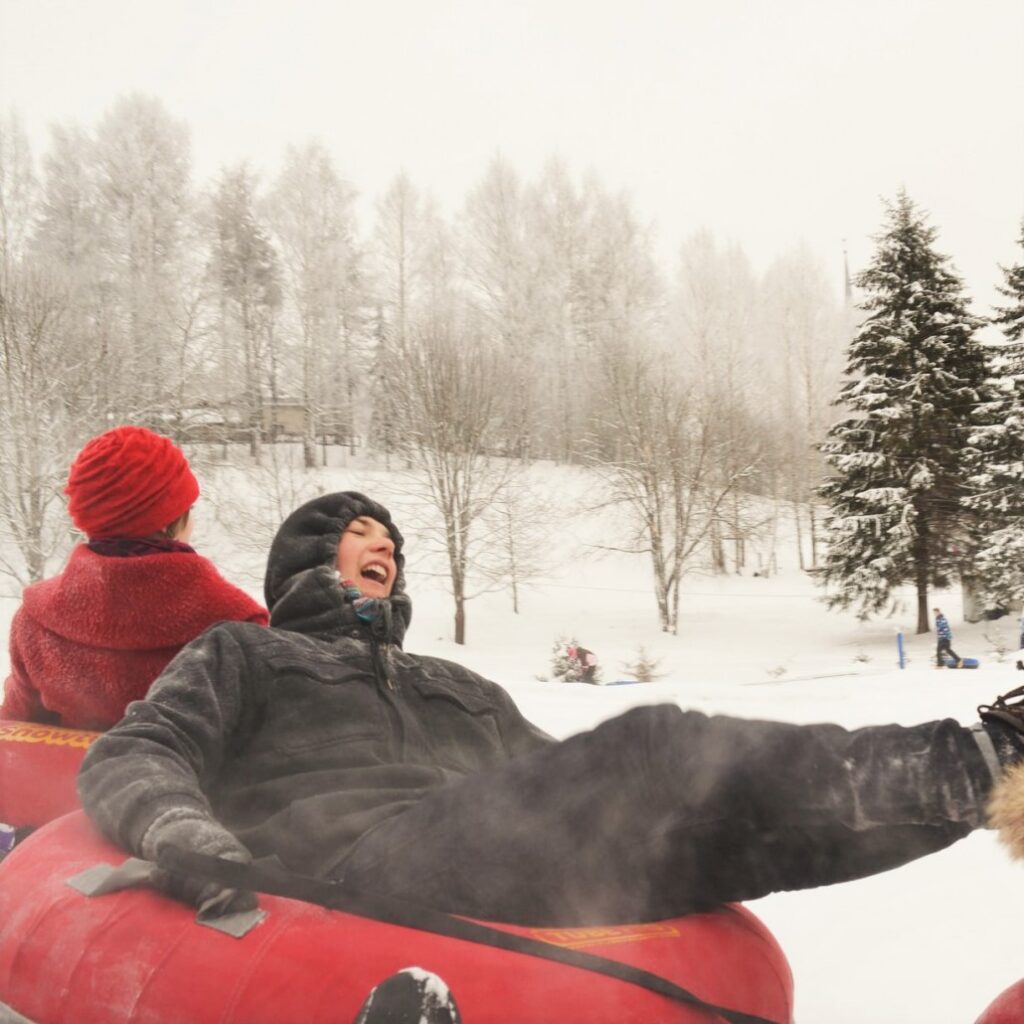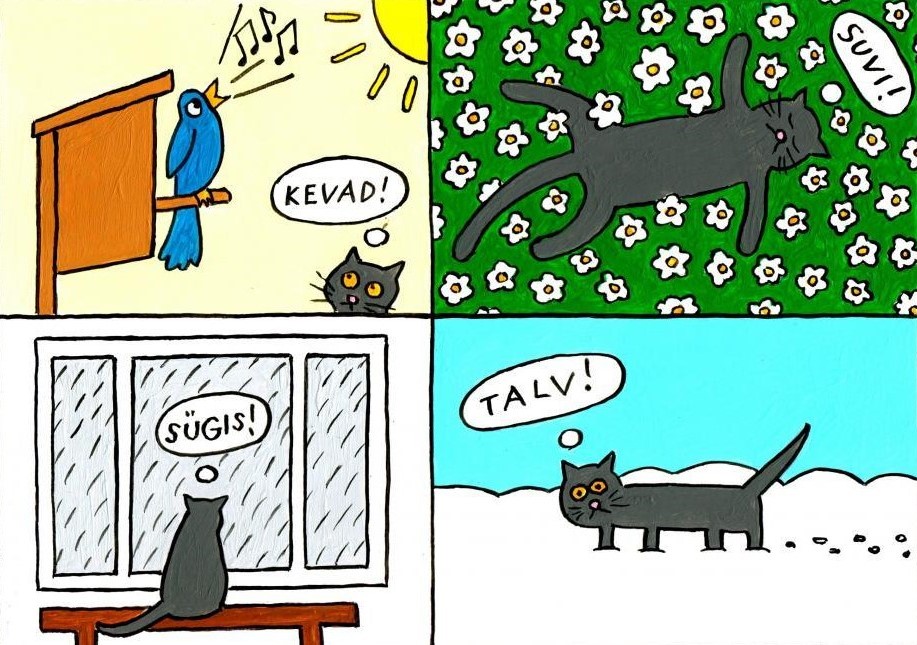Claire Millard, a Brit living in Tallinn, is trying to crack the code – learn Estonian in Estonia.
As a teenager I travelled and lived abroad with nothing more than a fifty-five-litre backpack and the invincible confidence of youth. The desire to explore and experience never left, and when, fifteen years, one husband and two kids later, the opportunity to live abroad suddenly arose again – this time for my husband’s dream job in Tallinn – I was delighted.
Cue some research about Estonia – our basic requisites being that we move to a country interesting enough to pack our time there with learning about the region, but not so insurmountably alien that it might terrify the nascent traveller-explorer in our children. A cursory check of our no-go list – even my impetuous self would struggle with living somewhere with wildly different ideas about women’s rights, for example, or a crime rate that makes the eyes water; and the decision was made.
Learn Estonian – it can’t be that difficult, can it?
We arrived in Tallinn just in time for the winter solstice; dark days, roaring fires and the magical Christmas market gave way to the riotous celebrations of New Year (I have never before heard a seven-year-old ask for permission to go to bed because the fireworks were going on too long); and I set about my first mission. Learn Estonian – it can’t be that difficult, can it?

The forecast high for the day is minus fourteen degrees Celsius (7°F). There has been little snow for a few days, and the tramping of weary feet has turned ungritted pavements in the capital to passable cross country ski runs.
I sit in a bare, modern classroom at the prestigious Tallinn University, surrounded by the circumstantially obligated and the academically masochistic, attempting to grasp one of the worlds most difficult, and perhaps least useful languages. To ensure our focus, the teacher leaves the windows wide open.
“Why?!” is the usual deadpan response when I tell an Estonian I want to be part of their secret club. And it is a fair question.”
“Why?!” is the usual deadpan response when I tell an Estonian I want to be part of their secret club. And it is a fair question.
Of my classmates, some have straight forward answers; the romantic (the Brazilian archaeologist who fell in love with an Estonian in the Amazon and followed him here); the pragmatic (the businessman hoping to pass the government-mandated language tests to secure better tax breaks for his company); those moving towards something (the Dutch guy finally reunited with his Estonian girlfriend after years of cross border commuting), and those moving away (the Russian couple who curl their lips at the mention of their country’s politics). Some are slightly more off the wall – the Japanese classmate following her beloved Baruto-san, the Estonian champion sumo wrestler, only to find that he is retiring from the sport and returning to Estonia to his family farm.
And me. I would have laughed if you had told me six months ago I would be spending my winter in the Baltics, wearing the ill-advised love child of a duvet and a onesie and trying to crack a language so impenetrable it was apparently used in the Second World War to communicate among allied spies (the axis powers being convinced it was code. Or perhaps elvish). But here I am. When the suggestion arose that we move the family here, the permanently invincible teenager in me clearly answered. Possibly before looking the Baltics up on a map.
“I would have laughed if you had told me six months ago I would be spending my winter in the Baltics and trying to crack a language so impenetrable it was apparently used in the Second World War to communicate among allied spies”
My motley crew of classmates and I make up the beginners class in Estonian at the Tallinn University Winter School; a three week long series of short courses demonstrating the university facilities, expertise and range of courses, this season ranging from Estonian and Russian language classes to “experimental interaction” and “ways of seeing the past”.
The school is a big draw to lecturers and foreign students alike, with some students deciding to stay on afterwards. The Winter School is the little sister to the more established Summer School, for those who prefer the white nights of midsummer to the delights of the northern winter.

“This is Estonia – no sex, no future”
Estonian sits in the Finno-Ugric family of languages, intelligible only to those over the water in Finland (and historically related also to Hungarian, although these days the languages have diverged somewhat). It is the official language for the population of 1.3 million in Estonia, although a large number of Estonian Russians don’t use it.
For Estonia, language, as a marker of nationhood, is sacred. The pragmatic education system ensures fluency in English for all young Estonians (the older generations having learned Russian under the Soviet system and Finnish from the TV broadcasts beamed over from Helsinki); but the bewildered response to a foreigner learning the language seems less about pragmatics and more about keeping gate crashers away from the party.
“The pragmatic education system ensures fluency in English for all young Estonians; but the bewildered response to a foreigner learning the language seems less about pragmatics and more about keeping gate crashers away from the party.”
Dissuading foreigners to try isn’t hard. Estonian has fourteen cases, no gender, three forms of every single word and no specific future tenses. As my Estonian teacher cheerfully recounts, “this is Estonia – no sex, no future”.

Half the class disappears
After a week of learning vocabulary, I have a list of words as long as my arm and I’m starting to understand odd bits of billboard (bizarrely mainly the public service announcements suggesting people lay off the vodka and so on).
We then turn, with typical Estonian gallows humour, to grammar. A week of slaving over cases and tense, results in the conclusion “some of this stuff, you just have to learn”; like why you go “into” some towns, but “onto” others. About this point the temperature really plummets, and whether the cause is this or the grammar, half the class disappears. One classmate – an eccentric Frenchman of the type that creates the impression that a mastery of French relies on exaggerated hand gestures and the word “boff!” – has to attend an emergency in Malawi. Others are not so creative.
After three weeks I am able to proficiently read warnings against going outside in the dark without your (legally required) reflectors and about the dangers of blindness caused by illegal, methanol-based vodka. Talking in any useful fashion has been slower progress, but I have made some friends and swapped some tales and will continue to work on the application of my language skills.
“After three weeks I am able to proficiently read warnings against going outside in the dark without your (legally required) reflectors and about the dangers of blindness caused by illegal, methanol-based vodka.”
In the real world, I have been trying to practise my budding skills. In the newsagents I top up my bus card, “Palun, viis päeva”.
The assistant, who has served me several times before, and knows I am studying, humours me. Then he opens fire with a barrage of Estonian I am pretty sure he knew I could not understand. My eyes betray me. He smiles the smile of a man who has seen many before me, have a bash, but ultimately submit to the complexities of his native tongue. We complete the conversation in fluent, chirpy, Americanised English, and I return to my study guide.
* Adapted from the article first published in the Young and Global magazine. Cover photo by Ilmar Saabas (Maaleht). Please consider supporting Estonian World for the continuous improvement of our publication.


Success Claire … it will become more interesting when you have to learn how to put your shoe in your leg etc…..
and a hat in your head and gloves into your hands – but here is a pattern, don’t you guys see??
Wait until you ask if you have diarrhea, when what you mean to say is, “is my bag open?” One letter difference between thise two questions. Just one.
As a brit also learning Estonian, living in Tallinn, working in Kabul and holidaying in Kiev, i can thoroughly recommend Keeleklikk. All the very best Claire!
Õnne ja edu sulle Claire! It’s hard, but it’s worth it! Estonian is the most beautiful secret language in the world! Are your children also learning it? The best will be when you are in another country and can speak your secret language.
You were very lucky with winter, because this year it was very mild,.. If you stay for next year, then you will see what Estonian winter is all about*.. *hint- minus 30 degrees is okei weather in Estonia..
parimate soovidega Claire! as an expat Brit living in Canada married to an Estonian, I have some of the bare necessities by osmosis. I love what little I know, if I didn’t live in the country outside Toronto I might have taken lesson at Eestikool. I loved both my trips to Estonia, great country, great people. I found Vana Tallinn magical.
hmmm…I think “mutts pahe” (sorry, don’t know where the dipthongs are on my keyboard) would actually mean “hat to the head” not “hat in the head”…best of luck Claire…do keep us posted on your adventures in Estoland…
It’s actually an archaic form for illative case. In literature you can see «into the night» rendered as öhe instead of öösse.
that’s right, and “king jalga” is also “shoe to the foot” and not “shoe into the foot” (i.e. the illative case as below). it becomes especially tricky to learn a new language when the teacher is a non-native english speaker – there’s a two-way lost-in-translation element here that needs to be considered. it’s a constant going back and forth to figure out the patterns that make sense for you personally, based on your native language or any other language logic you are comfortable with. good luck and all the best!
I’m panamanian and currently learning Estonian (on my own and with keeleklikk). Is not easy but I’m not giving up, I like it. Will visit your beautiful this coming september.
You should get an MA in linguistics just for learning it! I grew up in Canada but my parents were post WW2 immigrants and spoke Estonian at home so it was my first language. English came quickly enough watching TV and playing with the neighboring kids. Estonian Sunday school, cubs and scouts and summer camp helped maintain my basic Estonian. French and later German classes at school made it obvious that Estonian was quite different not just in vocabulary but in grammar from the mainstream European languages. I figured that if you weren’t born into it, Estonian would be about as easy to learn as Urdu or Tagalog for an average white guy, with far fewer opportunities to employ it on a worldwide basis.
However, that doesn’t make it impossible if one’s determined. One uncle remained in Germany after WW2 and settled in Munich. On one visit in the mid 1970s I asked him if he’d managed to teach his daughter any Estonian. There were only a few 100 Esto immigrants there so none of the ethnic community activities available in Toronto and when he had attempted to teach her a few words on a few occasions she’d plugged her ears and declared herself a 100% Bavarian. (Northern Germans are considered foreigners there). However, in her student years she visited the newly emerged Estonia and added it to her list of causes along with ecology, veganism, animal rights and disarmament, relocated there and quickly became fully fluent.
Palju edu sulle, Claire! Ongi raske keel aga ilus ka, ja just kui sa arvad et on lootusetu, sa hakkad aru saama ja tasapisi sa isegi raakid. Sorry, my keyboard doesn’t support Estonian characters. Kui ma elasin seal noore naisena, teadsin et Eesti on niivord eriline ja ilus, ja ikka soovin mina tagasi!
My parents were born in Estonia, but I was born in New Jersey, 1954. I went to visit Estonia in 2010. I stayed with my cousin in Rapla. We went to the annual town festival in Valga. Now, I speak Estonian because that is what we spoke at home but over the years has deteriorated severely. At the festival, all in our party, (my Sister, my cousin, her husband) all wanted to see and do different things. So, where and when to meet up? We were by the stage, which the word for I could not remember. So, I said to go where the rasva tantsijad put on their show. I was subject to huge roars of laughter, but encouragement for trying. I meant to say rahvatantsijad. folk dancers. Instead, I said grease dancers! Tough language. ONE letter makes a big difference!